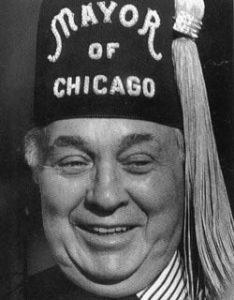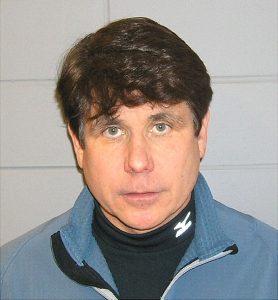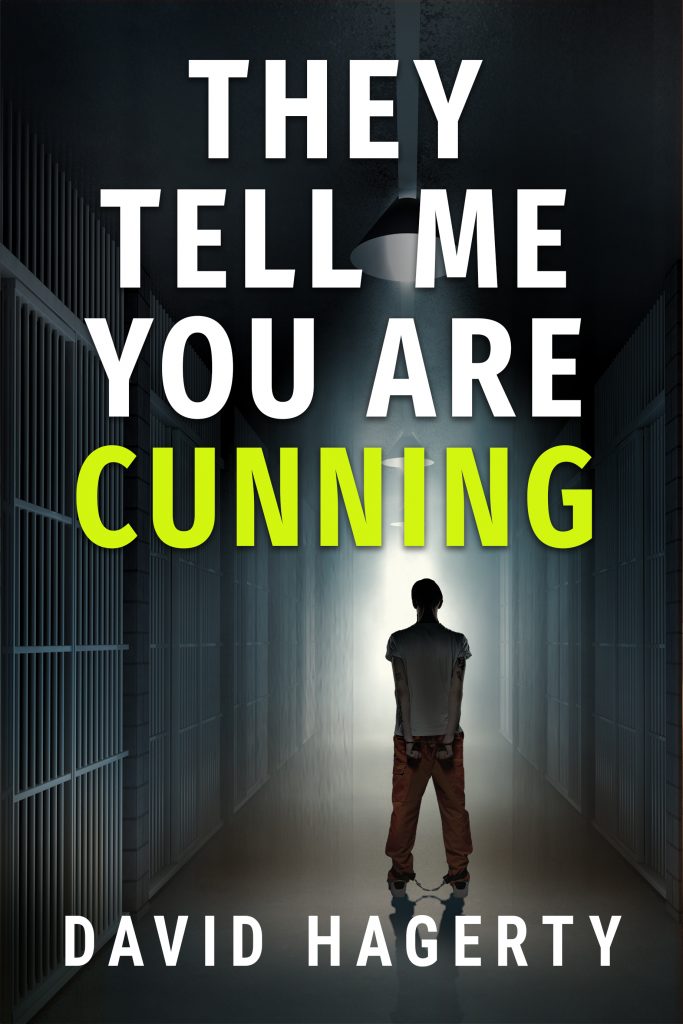Last month saw the arrest of Alderman Ed Burke—who has served on Chicago’s City Council since I was a child—for extorting donations to his campaign. This is only the latest is a long history of corruption in Illinois, particularly in its major metropolis. Such shenanigans also create the backdrop for my four novels, which play on the Second City’s reputation for dirty politics.
As a primer, I’ll list some of the lowlights from the state’s history. This summation is far from comprehensive (with 50 aldermen in the city alone, many up to something, how could it be?) but it will give readers the Cliff Notes version.
First among them has to be Mayor Richard J. Daley, also known to locals as Da Mayor, Hizzonor, and simply Boss. For clarity’s sake, I have to acknowledge two things: Daley was never charged with any crime, and I’m referring here to the first Mayor Daley, not his son who succeeded him in office.
 Daley is credited with perfecting a political machine that kept him in power for five terms. In truth, the Cook County Democratic party had controlled things since Anton Cermak took office in 1931, what is locally known as dynasticism. The Boys from Bridgeport (an Irish working-class neighborhood that nonetheless churned out five mayors in sixty years) controlled elections through many means. Among their favorite tricks were:
Daley is credited with perfecting a political machine that kept him in power for five terms. In truth, the Cook County Democratic party had controlled things since Anton Cermak took office in 1931, what is locally known as dynasticism. The Boys from Bridgeport (an Irish working-class neighborhood that nonetheless churned out five mayors in sixty years) controlled elections through many means. Among their favorite tricks were:
- Four-legged voting (a friend from the party who accompanies you into the voting booth to ensure you pulled the right levers)
- Hobo floto voto (those same partisans leading vagrants by one shaky hand to the polling stations)
- Vote early, vote often (those not content to cast just one ballot)
- Don’t let death disenfranchise you (those who are resurrected on election day)
The Machine was so called for its small army of patronage workers, precinct captains, and ward committeemen who dispensed favors to friends and meted out retribution to the disloyal. Every civil servant was expected to vote the ticket and to get their friends to do the same.
Some say that the Machine continues churning out victories to this day while others will tell you that the power of the Cook County Dems started to wane with Daley’s passing in 1977, resulting in the city’s first female and African-American mayors.
However, a grand jury report in 1982 found widespread instances of fraud, including vote buying, impersonation, and manipulation of ballots cast by the elderly and disabled.
Chicago is hardly alone in its corruption. Illinois’ state capitol has also produced more than its fair share of crooks, including four governors who’ve gone to prison in my lifetime. The distinction belongs to:
- Rod Blagojevich, who tried to sell Barak Obama’s U.S. Senate seat after he was elected president.
- George Ryan, who sold commercial driver’s licenses to unqualified truckers, including one who killed six children.
- Dan Walker, who generously offered himself money from a savings and loan that he owned.
- Otto Kerner, who was convicted of bribery, conspiracy, perjury and income-tax crimes (obviously, he was a busy man).
A few more of the major and petty offenders:
- Dan Rostenkowski, who served 22 years in the U.S. House, including many as chair of the Ways and Means Committee, which governs taxation, pleaded guilty to mail fraud.
- Jess Jackson Jr. (son of the prominent preacher and one-time presidential candidate), who used campaign funds to buy $750,000 in goods for himself and his wife, including a Michael Jackson fedora and cashmere capes.
- Dennis Hastert, former speaker of the U.S.House, for sexually abusing four boys who he coached in wrestling.
What breeds such contempt for democracy? In my stories, it’s less about greed or power than blind spots. We come to accept our own world view as correct because we cannot see any other. As a wise man once told me, everyone believes their own b.s.
To see more images of the guilty, go to my Pinterest pagefor infamous Illinois politicians.







